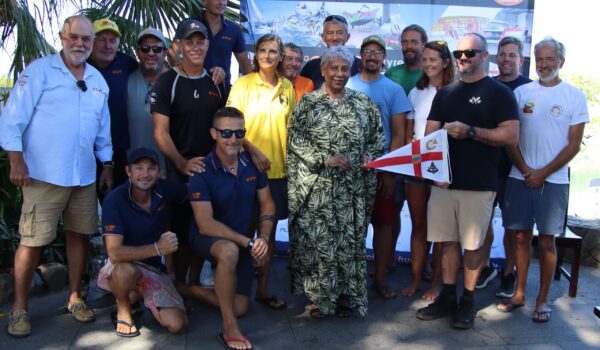
UniFiji’s Chess Education Strategy Garners Global Recognition and Local Impact
August 12, 2025Call For Application: Completion Of Programme – December Graduation
August 12, 2025UniFiji and Mini Globe Boat Race Share Common Fact of Endurance
The University of Fiji’s participation at the starting line of the Vuda Marina to Cape Town leg of the global small boats race on Saturday was symbolic of shared endurance despite all odds.
The University of Fiji was asked to blow the conch shell to start off the Mini Globe Race from the University’s Drua, the I Vola Sigavou, on Saturday.
Vice Chancellor Professor Shaista Shameem said staff and students formally restarted the global race of small boats on its second leg between Fiji and Cape Town. The small boats, each with a single skipper and no other crew, are continuing the race from Fiji over the top of Australia, then through the Indian Ocean to the treacherous Southern Ocean to complete the third part of the race. After Cape Town the boats will travel to their final destination, Portugal from where the race started in December 2024.
Professor Shameem said that when Adam Wade of Vuda Marina requested UniFiji to restart the race from the marina to Cape Town by blowing the conch shell from the I Vola Sigavou, they did not hesitate. On UniFiji’s part, their participation was an appreciation of the endurance of the sailors who had only an abundance of sheer grit to enable them to survive. It resonated with UniFiji’s own experience of running a University with nothing but the sniff of an oily rag, as the saying goes, she said.
Don McIntyre, the Founder and Chair of Ocean Frontiers Pty Ltd which is the company behind the race, expressed his appreciation on behalf of the Mini Boat skippers for the University’s participation to restart the race from the Drua. A group of the University’s staff and students sailed on the I Vola Sigavou to the starting line just outside the Vuda Marina lagoon where Centre for i-Taukei Studies student, Anare Ramanakiwai, in full warrior costume blew the conch to start the race off.
McIntyre said the motivation behind the Mini Globe Race was to invite the owners of small boats to have an adventure. The skippers all built their own small boats from plywood in their backyards, designing them specifically to sail round the world so they are safe and strong, he said. The skippers come from all over the world and their aim is to circumnavigate earth in their small boats. The boats do not have engines, just angles.
Two of the 15 skippers are women, Pilar Pasanau from Catalonia in Spain and Jasmine Harrison of the UK. Jasmine Harrison holds the 2021 world record for becoming the youngest solo female to row across the Atlantic at the age of 21 and the first female to swim the full length of the British Isles from top to bottom in 2022. She became a sailor only in 2023, and said that sailing around the world in a small boat was her toughest endurance challenge so far. “The leg from Tonga to Fiji almost broke me with no wind for days and then huge waves crashing over the boat in the middle of the night” she said.
Pilar Pasanau said her experience of the third leg was the biggest challenge but her experience of sailing the Atlantic several times solo took her through. Landfall in Fiji with the warmth of the people and place had rejuvenated her, she said. This was the sentiment expressed by all the skippers as they prepared to leave again for another arduous 10,000 nautical mile trip into the Southern Ocean, across to Cape Town.
The General Manager of Vuda Marina, Adam Wade said that the University’s involvement in the race restart was a powerful way of highlighting Fiji’s sailing heritage. In the past the drua was the main form of transport and the skippers of the small boats in the race were delighted to have the University’s presence at the race.
“It is important that that the drua tradition is revived and recognized as well, because the older crafts will go a lot faster than modern ones.
Wade also highlighted Vuda Marina’s long-running sailing education programmes.“We’ve been teaching kids how to sail for 12 years now, and we teach anywhere between 200 to 400 kids a year,” he said. “It’s amazing how many of them are naturals. They can figure out wind angles and how to make the boat go in a certain direction.
Reflecting on the broader significance of the Mini Globe Race, Wade said the most important thing to him was that the skippers are home boatbuilders. You don’t have to be in a multi-million-
dollar boat. You can do this in something you created yourself.”
Wade was also recently named an honorary member of the Mini Globe Racers. On what the race means for Fiji’s visibility on the global sailing map he said that the attention had earned a lot for similar challenges in the future. “I definitely hope this opens more possibilities. Fiji is just geographically located in a great part of the world. When people are doing a circumnavigation of the Earth, the trade winds are going to push you to Fiji eventually. You can get repairs done, provision, have your friends and family come visit, and have a holiday. It’s a good thing for Fiji.”
Speaking on the eve of the restart, Professor Shameem said that the University was able not only to meet intrepid and very brave skippers and sailors but also to take part in a very emotional farewell of the boats as they continued on their journey across the world. The Drua itself had a proud seafaring origin and so to be able to participate in the momentous race at the beginning was an honour for the University.



